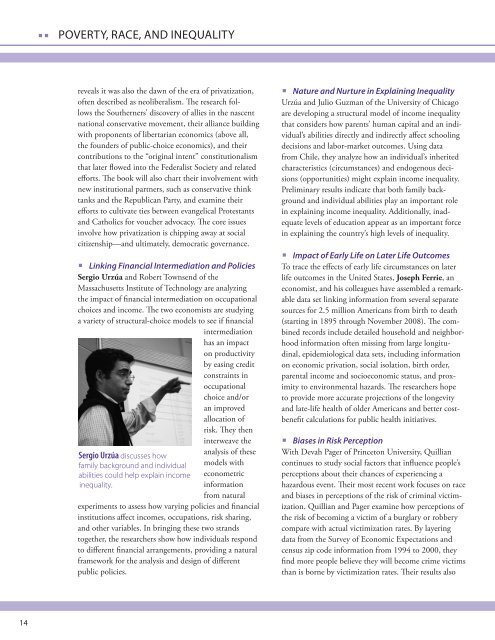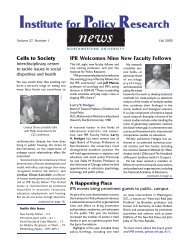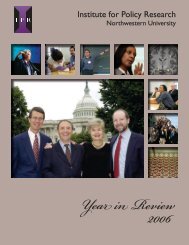IPR - Institute for Policy Research - Northwestern University
IPR - Institute for Policy Research - Northwestern University
IPR - Institute for Policy Research - Northwestern University
You also want an ePaper? Increase the reach of your titles
YUMPU automatically turns print PDFs into web optimized ePapers that Google loves.
Poverty, Race, and Inequality<br />
reveals it was also the dawn of the era of privatization,<br />
often described as neoliberalism. The research follows<br />
the Southerners’ discovery of allies in the nascent<br />
national conservative movement, their alliance building<br />
with proponents of libertarian economics (above all,<br />
the founders of public-choice economics), and their<br />
contributions to the “original intent” constitutionalism<br />
that later flowed into the Federalist Society and related<br />
ef<strong>for</strong>ts. The book will also chart their involvement with<br />
new institutional partners, such as conservative think<br />
tanks and the Republican Party, and examine their<br />
ef<strong>for</strong>ts to cultivate ties between evangelical Protestants<br />
and Catholics <strong>for</strong> voucher advocacy. The core issues<br />
involve how privatization is chipping away at social<br />
citizenship—and ultimately, democratic governance.<br />
< Linking Financial Intermediation and Policies<br />
Sergio Urzúa and Robert Townsend of the<br />
Massachusetts <strong>Institute</strong> of Technology are analyzing<br />
the impact of financial intermediation on occupational<br />
choices and income. The two economists are studying<br />
a variety of structural-choice models to see if financial<br />
intermediation<br />
has an impact<br />
on productivity<br />
by easing credit<br />
constraints in<br />
occupational<br />
choice and/or<br />
an improved<br />
allocation of<br />
risk. They then<br />
interweave the<br />
Sergio Urzúa discusses how<br />
family background and individual<br />
abilities could help explain income<br />
inequality.<br />
analysis of these<br />
models with<br />
econometric<br />
in<strong>for</strong>mation<br />
from natural<br />
experiments to assess how varying policies and financial<br />
institutions affect incomes, occupations, risk sharing,<br />
and other variables. In bringing these two strands<br />
together, the researchers show how individuals respond<br />
to different financial arrangements, providing a natural<br />
framework <strong>for</strong> the analysis and design of different<br />
public policies.<br />
< Nature and Nurture in Explaining Inequality<br />
Urzúa and Julio Guzman of the <strong>University</strong> of Chicago<br />
are developing a structural model of income inequality<br />
that considers how parents’ human capital and an individual’s<br />
abilities directly and indirectly affect schooling<br />
decisions and labor-market outcomes. Using data<br />
from Chile, they analyze how an individual’s inherited<br />
characteristics (circumstances) and endogenous decisions<br />
(opportunities) might explain income inequality.<br />
Preliminary results indicate that both family background<br />
and individual abilities play an important role<br />
in explaining income inequality. Additionally, inadequate<br />
levels of education appear as an important <strong>for</strong>ce<br />
in explaining the country’s high levels of inequality.<br />
< Impact of Early Life on Later Life Outcomes<br />
To trace the effects of early life circumstances on later<br />
life outcomes in the United States, Joseph Ferrie, an<br />
economist, and his colleagues have assembled a remarkable<br />
data set linking in<strong>for</strong>mation from several separate<br />
sources <strong>for</strong> 2.5 million Americans from birth to death<br />
(starting in 1895 through November 2008). The combined<br />
records include detailed household and neighborhood<br />
in<strong>for</strong>mation often missing from large longitudinal,<br />
epidemiological data sets, including in<strong>for</strong>mation<br />
on economic privation, social isolation, birth order,<br />
parental income and socioeconomic status, and proximity<br />
to environmental hazards. The researchers hope<br />
to provide more accurate projections of the longevity<br />
and late-life health of older Americans and better costbenefit<br />
calculations <strong>for</strong> public health initiatives.<br />
< Biases in Risk Perception<br />
With Devah Pager of Princeton <strong>University</strong>, Quillian<br />
continues to study social factors that influence people’s<br />
perceptions about their chances of experiencing a<br />
hazardous event. Their most recent work focuses on race<br />
and biases in perceptions of the risk of criminal victimization.<br />
Quillian and Pager examine how perceptions of<br />
the risk of becoming a victim of a burglary or robbery<br />
compare with actual victimization rates. By layering<br />
data from the Survey of Economic Expectations and<br />
census zip code in<strong>for</strong>mation from 1994 to 2000, they<br />
find more people believe they will become crime victims<br />
than is borne by victimization rates. Their results also<br />
14
















